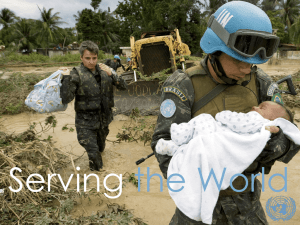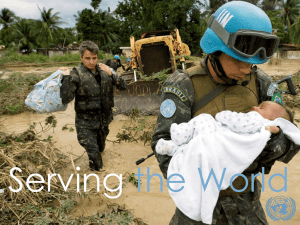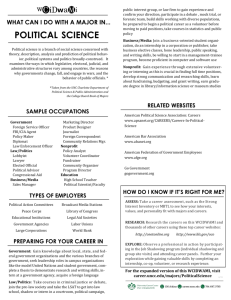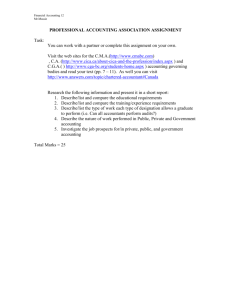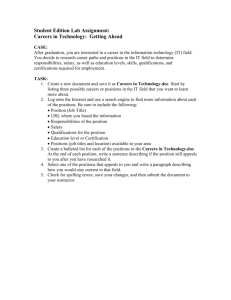The United Nations Secretariat is looking for competent and
advertisement
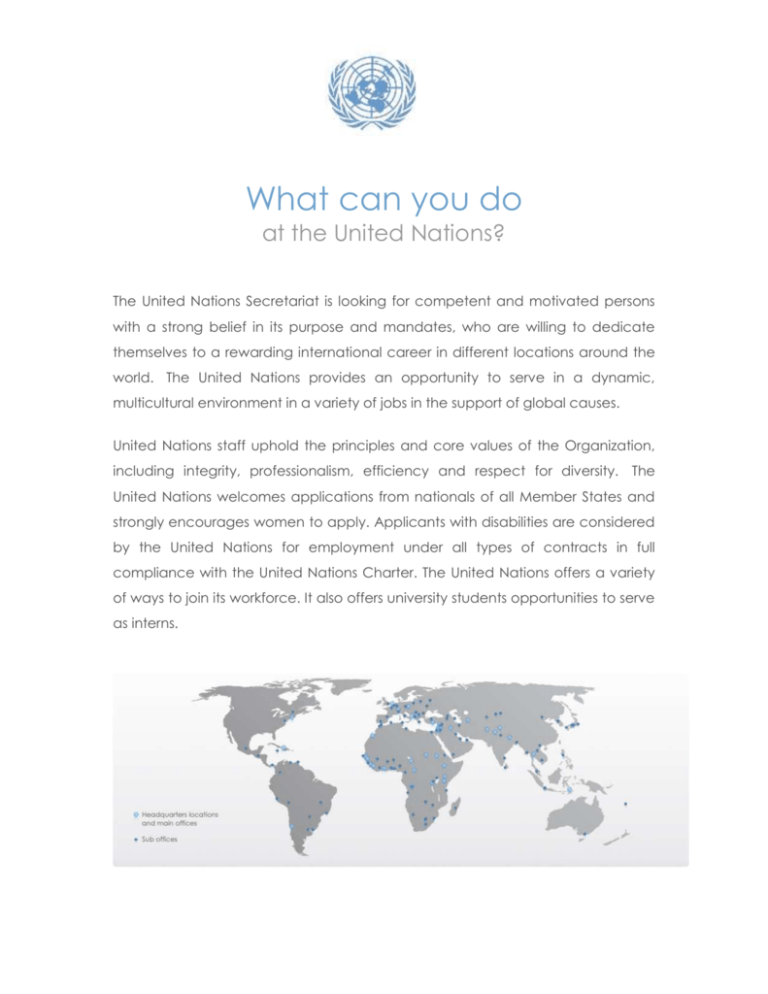
What can you do at the United Nations? The United Nations Secretariat is looking for competent and motivated persons with a strong belief in its purpose and mandates, who are willing to dedicate themselves to a rewarding international career in different locations around the world. The United Nations provides an opportunity to serve in a dynamic, multicultural environment in a variety of jobs in the support of global causes. United Nations staff uphold the principles and core values of the Organization, including integrity, professionalism, efficiency and respect for diversity. The United Nations welcomes applications from nationals of all Member States and strongly encourages women to apply. Applicants with disabilities are considered by the United Nations for employment under all types of contracts in full compliance with the United Nations Charter. The United Nations offers a variety of ways to join its workforce. It also offers university students opportunities to serve as interns. Job networks and families Job networks have been established to promote greater career opportunities for staff members. Each network is a flexible grouping of departments and offices whose mandates, programmes of work and interests are closely linked to each other. An eligible staff member can join based on his career interest one or more of the following networks: Economic and Social Development Management and Operations Support Political, Peace and Security Information Systems and Communication Technology Legal Conference Management Safety and Security Some job families: Economic Affairs Environment Affairs Population Affairs Statistics Social Sciences Public Administration Programme Management Science and Technology Drug Control and Crime Prevention Administration Audit Finance Procurement Human Resources Medical Production, Service & Transport Management & Programme Analysis Ethics Engineering Pension Management Logistics Political Affairs Humanitarian Affairs Human Rights Civil Affairs Electoral Affairs Rule of Law Information Management Jurists Legal Affairs Ombudsman Public Information Protocol Conference Services Language Security Safety More on job networks https://careers.un.org/lbw/home.aspx?viewtype=JN 2 __________________________________________________________________________________ Not an official document UNRIC EU – September 2011 What are the career options? Starting points (ages 18-61) Professional jobs (internationally recruited) o Global Secretariat (established and field duty stations) Young Professionals Programme Language Examination Associate Expert Programme General Service (locally recruited) Internship Programme United Nations Volunteers (UNV) (unvolunteers.org) Temporary Jobs Staff Categories The United Nations workforce is made up of different categories of staff. Within each category there are different levels, which reflect increasing levels of responsibilities and requirements. The information in this section will help you decide in which staff category, and at what level, you fit in. This will be useful when you start searching and applying for jobs. 3 __________________________________________________________________________________ Not an official document UNRIC EU – September 2011 These are the different categories of staff at the United Nations: Professional and higher categories (P and D) General Service and related categories (G, T/C, S, PIA, LT) National Professional Officers (N) Field Service (FS) Senior Appointments (SG, DSG, USG and ASG) What work experience do I need? Your work experience should be relevant to the job for which you are applying; each job may also have specific requirements, which are specified in the opening. For mid-career and senior level positions, progressively responsible work experience is required. As you acquire more relevant work experience you can progressively apply for higher positions. Figure: experience requirements for professional and higher categories (P and D) Entry level professionals Mid-level professionals P-2 minimum 2 years P-4 of work Senior level professionals minimum 7 years of P-6/D-1 minimum 15 years of work experience work experience experience P-3 minimum 5 years of work P-5 minimum 10 years of work experience P-7/D-2 more than 15 years of work experience experience More on staff categories http://careers.un.org/lbw/home.aspx?viewtype=SC 4 __________________________________________________________________________________ Not an official document UNRIC EU – September 2011 Young Professional Programme The United Nations is looking for highly qualified candidates who are ready to launch a professional career as an international civil servant. The young professionals programme (YPP) is a recruitment initiative that brings new talent to the United Nations through an annual entrance examination. This programme builds upon the national competitive recruitment examination (NCRE) which was held for the last time in 2010. Are you eligible to participate in the young professionals programme examination? Do you hold at least a first-level university degree? Are you 32 or younger by the end of this year? Do you speak either English and/or French fluently? Are you a national of a participating country? The examination is held worldwide and is open to nationals of countries participating in the annual recruitment exercise - the list of participating countries is published annually and varies from year to year. Participating countries in 2011 include Andorra, Austria, Belgium, Cyprus, Denmark, Estonia, Finland, France, Germany, Greece, Hungary, Italy, Liechtenstein, Lithuania, Monaco, Netherlands , Poland, Portugal, Romania, San Marino, Slovakia, Slovenia, Spain, Sweden and United Kingdom. This year the examination is held on 7 December 2011 in locations across the globe and is offered in the following job families: Administration, Humanitarian Affairs, Public Information, Statistics. More on Young Professional Programme 2011 http://careers.un.org/lbw/home.aspx?viewtype=NCE 5 __________________________________________________________________________________ Not an official document UNRIC EU – September 2011 Language examination The United Nations is looking for eligible candidates to fill language posts at the headquarters duty stations in New York, Geneva, Nairobi and Vienna, and in the regional commissions located in Addis Ababa, Bangkok, Beirut and Santiago. The examinations are organized to identify qualified and motivated language professionals willing and able to contribute their knowledge and skills to ensure high quality language services in support of multilateral communication among Member States of the United Nations - the world's only universal body. Based on the needs of the United Nations All language staff (interpreters, translators, etc.) must pass the applicable examination Language staff hired from the roster at the entry level (P-2) Usually up to age 55 Language examination applicants must: o Hold at least a first-level university degree o Be able to interpret or translate from two languages into main language More on Language competitive examination http://careers.un.org/lbw/home.aspx?viewtype=LE 6 __________________________________________________________________________________ Not an official document UNRIC EU – September 2011 Associate experts programme The goal of the Associate Expert Programme is to provide assistance to developing countries and to offer graduates from universities or institutions of higher education an opportunity to get professional experience in the United Nations Capacity Development. As an Associate Expert you are recruited under bilateral agreements between the United Nations and donor countries. Appointment is for a period of one year, with a possibility of an extension, depending on the performance and available funding from donor countries. Normally, donor countries require applicants to be under the age of 32 when applying to an Associate Expert vacancy, however the age limit varies depending on the donor countries, so please check their websites. More on Associate Experts Programme http://esa.un.org/techcoop/associateexperts http://careers.un.org/lbw/home.aspx?viewtype=AEP 7 __________________________________________________________________________________ Not an official document UNRIC EU – September 2011 Volunteer programme If you are inspired to take concrete action for global peace and development, take a look at the United Nations Volunteer (UNV) programme. UNV volunteers work in 128 countries promoting peace, responding to disasters, empowering communities and helping to build sustainable livelihoods and lasting development. They work at the heart of communities in partnership with governments, United Nations agencies and civil society. Not a career in itself (you are limited to 8 years of service) Not an entry route to the United Nations (you can apply to UN positions as an external candidate, but are expected to complete your UNV assignment). Volunteers receive a modest living allowance. More on UNV Programme www.unvolunteers.org 8 __________________________________________________________________________________ Not an official document UNRIC EU – September 2011 Internship programme If you are thinking of entering the world of diplomacy and public policy, an internship at the United Nations could be the ideal start for you. The objective of the internship is to give you a first-hand impression of the day-today working environment of the United Nations. The UN offers internship programmes to students enrolled in a Master’s or Ph.D. programme or are in their fifth year of studies towards the completion of a university degree. They must have an excellent command of English or French. Please note that internships are posted regularly on an “as needed” basis. Deadlines will vary based on departments’ needs and availability. The internship programme lasts for at least two months and can be as long as six months. The internships are unpaid. There are internship programmes at all major locations of the United Nations: Geneva, Beirut, Addis Ababa, Nairobi, Vienna, Santiago, etc. You can for example apply for an internship at the UN headquarters in New York: http://www.un.org/Depts/OHRM/sds/internsh/index.htm More on available internships https://careers.un.org/lbw/home.aspx?viewtype=IP 9 __________________________________________________________________________________ Not an official document UNRIC EU – September 2011 Temporary jobs Temporary appointments are used to fill positions a period of less than one year to meet seasonal or peak workloads and specific short-term requirements. Temporary appointments may, however, be extended beyond one year only when there are surge requirements, operational needs related to field operations and where circumstances have allowed for special projects with finite mandates. Temporary appointments, which include the initial appointment and any subsequent extensions, may not exceed a total period of no more than 24 months at any given time. Staff members holding a temporary appointment are considered external candidates when applying for job openings. Positions becoming available for such short-term requirements will also be advertised with the respective reference to their temporary nature. The application procedure for project personnel is the same as for any other position. More on Temporary jobs https://careers.un.org/lbw/home.aspx?viewtype=TJ 10 __________________________________________________________________________________ Not an official document UNRIC EU – September 2011 Career path Join through various entry points between ages 18 and 61 Move laterally to another department Move to another duty station Serve in a peacekeeping mission Promotion to higher level in same or different department or duty station or mission Pay and benefits Competitive Salaries Annual & Sick Leave Home Leave Mobility and Hardship Pay Maternity & Paternity Leave Rest and Recuperation Education Grant & Travel Rental Subsidy Defined-benefits Pension at age 62 Health Insurance Installation & Shipment & Pay for Additional Official Language (peacekeeping missions) Mentoring Programme for New Staff Development & Learning opportunities Repatriation Pay and Benefits http://careers.un.org/lbw/home.aspx?viewtype=SAL 11 __________________________________________________________________________________ Not an official document UNRIC EU – September 2011 How to apply United Nations Secretariat is transitioning to a new online recruitment system. During the transition period, both the previous (‘Galaxy’) and the new system (‘Inspira’) will run in parallel. When applying for a job opening published at the United Nations Careers Portal, you will be automatically directed to the appropriate system where you can submit your application. Applications from women candidates are strongly encouraged as the United Nations supports gender equality in the workplace. Job Openings http://careers.un.org/lbw/home.aspx?viewtype=SJ&vacancy=All Application Process http://careers.un.org/lbw/home.aspx?viewtype=AP Galaxy http://myun.un.org/Galaxy/Release3/info/Guide.aspx?lang=1200 Inspira https://inspira.un.org/psp/PUNA1J/?cmd=login 12 __________________________________________________________________________________ Not an official document UNRIC EU – September 2011 Searching for Job Openings http://careers.un.org 13 __________________________________________________________________________________ Not an official document UNRIC EU – September 2011 Searching for Job Openings http://careers.un.org 14 __________________________________________________________________________________ Not an official document UNRIC EU – September 2011 The United Nations e-Staffing System ‘Galaxy’ 15 __________________________________________________________________________________ Not an official document UNRIC EU – September 2011 The United Nations e-Staffing System ‘Inspira’ 16 __________________________________________________________________________________ Not an official document UNRIC EU – September 2011

